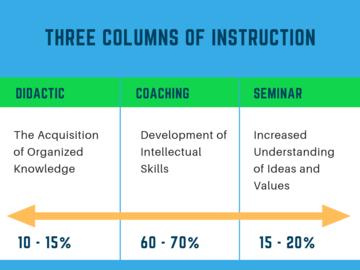
Our Approach
Paideia instruction is based on a set of philosophical beliefs. Our program has specific teaching practices based on those beliefs, to be implemented at every grade level, K-12, to make student learning more active and comprehensive.
The Three Columns of Instruction
The Three Columns of Instruction, as defined in the Paideia Principles, are integral to our approach and are designed to support specific aspects of learning in a fully integrated and complementary way. The columns are:
- didactic instruction leading to factual recall;
- intellectual coaching leading to skill development;
- and seminar dialogue leading to conceptual understanding.

It is important to note that these three columns are best practiced in active synergy, such that each of the three modes of teaching reinforces the other two. The fully realized Paideia Classroom features units of study integrated across subject areas. In teaching these units, the Paideia teacher uses all three columns where appropriate, and most importantly, uses them in a complementary manner.
For this reason, the three phases of Paideia School development are designed to:
- first, integrate the Paideia Socratic Seminar into a school’s instructional program;
- second, create fully realized Paideia Classrooms featuring all three columns;
- and third, implement powerful units of study in the form of Paideia Projects.
When we use Paideia instruction with schools and districts, we always seek to meet the specific challenges faced by the individual school community. This practice includes being responsive to both local curriculum requirements and teacher evaluation programs.
This site provides information using PDF, visit this link to download the Adobe Acrobat Reader DC software.
